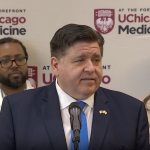
AMA furthers commitment to advancing health equity on Chicago’s west side with $3 million investment
As part of its continued efforts to advance health equity and improve health outcomes for historically marginalized communities, the American Medical Association (AMA) today announced a new $3 million multi-year investment in Chicago’s west side neighborhoods. This investment leverages AMA’s new commitment as an anchor mission partner with West Side United (WSU)—adding to a group of collaborators committed to addressing structural inequities, eliminating health disparities and improving economic vitality and educational opportunities in Chicago’s west side communities, which have been devastated by decades of neglect and disinvestment.
“In Chicago’s west side neighborhoods and neighborhoods like them across the country, historic disinvestment, coupled with structural racism, have contributed to systematic inequities that negatively impact the health of these communities. We know that system-level and structural change are needed to address these health inequities and improve the health of our communities,” said AMA CEO and Executive Vice President James L. Madara, M.D. “Having called Chicago home since 1888, the AMA is proud to work alongside West Side United and our fellow anchor partners to invest in change. Our collective contributions over the past few years have supported the growth of affordable housing, community spaces, and job development across 10 west side communities. I urge business and civic leaders across Chicago to utilize their resources, influence, and power to join us in our social impact investment strategy and help improve the lives and health of our neighbors on Chicago’s west side.”
Today’s announcement, hosted by the City Club of Chicago at The Hatchery on Chicago’s west side, builds on the AMA’s initial $2 million investment in 2020. The new funding announced today will support WSU’s multi-pronged social impact investing approach. WSU-coordinated impact investing is done in partnership with community development financial institutions (CDFIs) to help provide much-needed capital to foster economic opportunity, revitalize neighborhoods and support community transformation. AMA’s renewed commitments will lead to more investments in affordable housing, healthy food options, job creation projects and educational programs.
To date, West Side United partners have invested a combined $177 million in Chicago’s west side neighborhoods through local procurement, small business grants, and impact investing, including the AMA’s 5-year, $5 million investment. Since 2018, the collaborative’s funding has contributed to approximately 475 low-interest loans, including entrepreneurs, small businesses, and community-based organizations. CDFIs leveraged these investments for an additional $28 million to support the west side community and business projects. The West Side United investments also resulted in the creation and preservation of 420 housing units, as well as the construction and preservation of more than 34,000 square feet of non-profit and commercial real estate projects. Additionally, these investments have supported 432 construction jobs, preserved 64 local jobs, and created 126 community employment opportunities.
“The AMA’s continued investment is an example of what a meaningful, sustained commitment can do in our communities,” said Ayesha Jaco, Executive Director of West Side United. “We are honored to partner with a leading advocate for health care and catalyze enduring, positive change on the West Side. We will continue to seek new partners and encourage continued long-term investment on the West Side.”
Formed in 2017, West Side United’s mission is to improve social, economic, and structural determinants of health, particularly through improving access to care and community resources, improving mental and behavioral health, and preventing and reducing chronic disease. More specifically, West Side United’s primary goal is to reduce the life expectancy gap between Chicago’s Loop and 10 west side neighborhoods, especially considering the decrease in life expectancy across the nation since the start of the COVID-19 pandemic.
“Medical science tells us that the root causes of the chronic conditions that shorten too many lives on Chicago’s West Side — heart disease, cancer, stroke, diabetes, depression – are not the biology or behaviors of individuals, but systemic barriers including structural racism and economic deprivation that prevent everyone from having the opportunity to be as healthy as possible,” said John Rich, M.D., Director of the Rush-BMO Institute for Health Equity. “Systemic problems demand systemic solutions and Rush is proud to partner with the American Medical Association, West Side United and Chicago’s business and civic leaders in this bold, innovative approach that is also the essence of good medicine: treat the causes of disease, not just the symptoms.”
In addition to its financial investment through the collaborative, the AMA will also continue to support numerous other efforts aimed at making a positive impact on the health and well-being of residents living on Chicago’s west side, including working with more local health care institutions and organizations to improve blood pressure control rates and ultimately reduce the number of heart attacks and strokes among west side residents. Through its work as a WSU anchor mission partner, the AMA also plans to support volunteerism on the west side, including ongoing participation in wellness walks, collaboration on hypertension programming as well as providing expertise in the area of development and evaluation, among other anchor mission partner commitments.
Advancing its mission to promote the art and science of medicine and the betterment of public health, the AMA is working to eliminate longstanding health inequities—improving health outcomes and closing inequities gaps rooted in historical and contemporary injustices and discrimination. The AMA’s three-year strategic plan is dedicated to embedding racial justice and advancing health equity and calls on physicians to help dismantle the structural and social drivers of health inequities. Learn more about ongoing efforts at the AMA’s Center for Health Equity.






